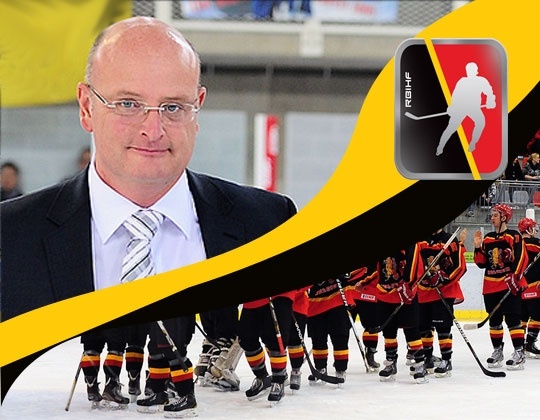Zopas vernemen wij dat de IIHF een eerder genomen interview met voorzitter Pascal Nuchelmans op haar website (IIHF.com) heeft gepubliceerd. Het interview werd afgenomen tijdens de Bekerfinale afgelopen seizoen in Luik. Wij geven U graag het volledige interview mee;
“ LIEGE, Belgium - The country is best known by a rich history of fine arts and a wide variety of beer, chocolates, waffles and French fries. Belgium does not pop up into people’s minds first when talking about ice hockey. However just as being a founding member of the European Union, the Belgians were one of the five countries that founded the International Ice Hockey Federation back in 1908.
Whereas the other four countries, Great Britain, France, Switzerland and Bohemia (nowadays Czech Republic) have been making noise on the ice, Belgium has been playing in lower divisions in recent decades. This doesn’t mean it is lacking ambition. In contrary, Royal Belgian Ice Hockey Federation (RBIHF) President Pascal Nuchelmans is on a mission to take the sport to another level.
In a new arena in Liège, IIHF.com caught up with Nuchelmans to learn more about the past, current and future of Belgian hockey.
Growing the sport
“One of the biggest problems when it comes to growing the sport is to have proper facilities. It’s a pity that we as a federation put in a lot of energy but when facilities are not improved, people will not show up,” Nuchelmans states. “With so much choice available, you’d need to ensure people will not just see ice hockey but also can enjoy good food, drinks and their own seat. I’m convinced we’ve got quality enough to offer but lack enough proper facilities. That is why I am very proud that Liège has realized this 1,200-seat arena.”
The arena is a first step in further developing the sport in the country and it now creates the opportunity to host official IIHF tournaments in Belgium. “Just like in any other sport, financial resources are required to make giant leaps forward. We’re not a very rich federation so we have to carefully select our goals,” he says. “We are putting our focus onto youth development, recruiting and goaltender training. Our Director of Development, Johan Bollue, is achieving great results there also with the help of the International Ice Hockey Federation, who offer support in setting up development camps.”
In that light the performances of the national junior teams are being given special attention. The U18 team of Belgium did a fine job finishing on a comfortable 4th place in the Division II Group B after having promoted from a lower division the year before. The U20 team was less successful and went pointless in a group that also contained lower seeded Israel and Australia. Next year the U20 will have to participate in Division III, a level they hadn’t been playing at since 2007.
Nuchelmans is not too worried though. “The relegation came somewhat expected,” he surprisingly admits. “Year by year we see we are being overtaken by countries where hockey is truly the number one or two sport. During one of the IIHF congresses I asked one of my fellow federation presidents how they are able to have their players practice 4-5 hours a day. I wondered how that’d fit in with their school obligations”
The answer he received said it all “School? School? We play ice hockey, that’s our main focus.” This approach in mentality forces Belgium to think differently and be more creative in order to stop the slide on the world ranking.
Financial Funds
The Belgian Ice Hockey Federation isn’t simply planning on paying sums of money to increase ice time as is often done in such situations. Nuchelmans enfolds his ideas of changing the mindset of people involved in hockey in Belgium. “In our country hockey comes after friends, family, school etc. whereas this is different in other countries,” he explains. “Don’t get me wrong, I do think there’s more important things in life than hockey and yes I will always plead for proper education to be more important than hockey but we’ve got to deal with the resources that we have and do as much as possible with the time available to us to improve the sport.”
Nuchelmans is not expecting a lot of help coming from the Belgian Olympic Committee (BOIC). “The only thing I get from them is an invoice of €750 every year,” he says jokingly. “Obviously their goal is not to promote the sport but to prepare athletes for Olympic participation, a thing we’re anything close to. Development of sports is a task of the federation, so we’ve always had to fund things by ourselves.”
Right now the federation is debt-free, which it wasn’t in the past and the President wants to keep it that way. “We create our own budget by hosting special events like the end-of-season Black Tie Party and by sensitizing the clubs that fulfilling their payments to us should be done on time, accurate and are a must. Clubs have to get used to this but when not meeting requirements we’ll take them out of the league, simple. Declaring yourself bankrupt only to start over under a new name is not going to cut it with me in charge of the Federation.”
Other support the federation is currently exploring is coming from the IIHF which has several projects running that can be subscribed to. “Their funding not necessarily comes in the form of money but can also consist of equipment, knowledge and people. So far we are happy with the returns we have been given and the people that have helped and contributed with efforts and expertise,” Nuchelmans endorses.
Gain and share experiences
Like in many other smaller nations, one route that has proven successful for young talents is to play outside the national borders. Currently there’s a number of Belgians playing in North America and Germany while also neighboring France and the Netherlands are common work areas.
Nuchelmans is realistic about the most talented players not playing in the Belgian league and does not regret it. “It is something we can’t stop. I hope they manage to develop their skills on and off the ice while playing abroad so that, when they return, they can re-invest their knowledge and experience in Belgian hockey.”
With several countries having their U20 team playing as a club team in the domestic league, Belgium has the rare situation that virtually their whole national team is playing for one and the same team: HYC Herentals. The team has been participating in the more skilled league in the Netherlands for several years now and hasn’t looked out of place there.
The RBIHF President has mixed feelings about the situation of HYC Herentals. “I first want to emphasize that I am very proud on what that team has achieved. It has been a reward for investing in youth hockey for many years when other teams were not doing this,” emphasizes Nuchelmans.
“The fact that the core of the national team can play together on a higher level is also something we all benefit from so I would like to give them all room to explore and develop further. On contrary it also means the experience and talent is not spread out across other teams.”
Nuchelmans’ ideal is restructuring Belgian hockey to a model in which all national team players are playing in a higher ranked league for about half a season. In the second part of the season these players will then be re-distributed across all other teams playing in the Belgian league in order to spread the level of talent and experience.
“Unfortunately it does not exist nowadays but I wouldn’t mind throwing out the idea to see how the clubs would react to it,” he reveals. “In the end, prime concern of the federation is improving Belgian hockey and not solely that of HYC Herentals of course.”
A separate U20 team participating in the Belgian league is also an idea the President has been thinking of, but he knows it cannot be realized overnight and needs approval and acceptance by all club teams first.
“In the end I want to ensure they all can benefit from it and not just a few teams. We finally established a situation that teams communicate open to each other and to the federation rather than fight each other in court. The extra energy can now be spent on development.”
No lack of innovation
It is one of the many changes the RBIHF has established or plans to realize in the future. In the last few years a lot has changed in Belgian hockey. No longer is the Belgian Cup final being televised countrywide as the potential gains that would bring do not weigh up to the costs. Instead local TV stations are broadcasting in order to generate more interest in the regions. Furthermore various new ways of generating additional income are being explored for example merchandise areas are now being sold rather than given away for free.
Things have also changed in the environment regarding national team events. “In the past this used to have a party-like tag labelled to it. When I was elected President one of the first things I stated was that the partying should stop. I refuse to spend around €100,000 for a party for 60 players. If not I threatened to pull the plug on Belgium participating internationally.”
Things now have changed according to Nuchelmans. “On senior level the players work hard without getting any financial compensation. On junior level players often have to contribute financially themselves. I think showing pride, commitment and effort should be primary things when country representation is at stake. The time of partying is behind us for good.”
By critically looking at every Euro spent, he aims to keep the federation financially healthy. “If we can do an international trip by bus rather than plane, we’ll do that. The same applies for our equipment, which is very expensive to ship by air. Now we rent a van have someone drive for two days to our destination and hopefully he’ll also return with all the gear,” he jokes.
All savings made are done for the purpose of being able to invest more money into the sport. A thing that both the federation and the clubs then can benefit from. “In the end it’s the clubs who own the federation.”
Also women’s hockey in Belgium is not forgotten or overlooked. With no specific league in place and not a large number of females playing the sport, Nuchelmans was forced to decide whether the federation could justify spending energy and money in that part of the game.
“I called together the core of the national team and challenged them to take ownership to prove they earn a spot in Belgian hockey,” he remembers. What then happened surprised him positively. “These women stepped up and came forward with some great ideas. I must honestly say that they do more to promote the sport than the average men’s squad is doing. They are for example present at the Belgian Cup final to sell shirts that we provided to them which generates some income for them.”
Slowly but surely women’s hockey in Belgium is on the rise especially in the youngest age groups. Yet without participating in a women’s league, the IIHF will not allow the Belgian women to play in official international events.
“To meet those demands we’re now looking to collaborate with our French neighbours to see if we can set up a joint league with Northern France in the near future. Talks about that are on-going at the moment,” Nuchelmans reveals.
Hall of Fame
As the interview is coming to an end, Pascal Nuchelmans is probably far from done outlining all plans he has in mind to ensure a more bright future of ice hockey in Belgium. But the future is not worth much if you don’t know your past. In Belgium the past is Paul Loicq.
Whereas most countries never have had an IIHF President, Belgium had two (Henri Van Den Bulcke and Paul Loicq), similar to Canada, the USA and Great Britain.
Loicq, a former player, referee and federation president, is a member of the IIHF Hall of Fame and he has contributed to the great strides that were made in increasing the sport throughout Europe in the 20th century. He also has got an IIHF award named after him that is presented annually to honour a person who has made outstanding contributions to the IIHF and international ice hockey.
Although Belgium is not as influential as it used to be, the RBIHF is trying to establish their own Hall of Fame in which Paul Loicq will feature prominently.
“Paul Loicq is the start of everything. He put Belgian hockey on the map,” Nuchelmans says.
Albeit on a smaller scale, Nuchelmans is trying to do just the same. Step by step and taking the time required with the aim to make sure Belgium also gets known by the public for its fastest game on ice.
Notes:
- The Royal Belgian Ice Hockey Federation, formed in 1912, recently launched a brand new website with more content and a fresh new look: www.rbihf.be
- Belgium has just over 1,000 registered hockey players of which almost 75% is U20 (372). The men’s national team is currently ranked 34th and recently won a silver medal in the Division II Group A in Croatia.
- The most well-known player Belgium has brought forward is probably Mike Pellegrims, who played over 500 games in the German top league (DEL) and has participated in the DEL All-Star game numerous times.
- The Belgian hockey season is comprised over two competitions. The Belgian Cup and the Belgian Championship. Both have got seven teams participating.
- In its existence of over 100 years, many noteworthy stories have occurred. One which is still notorious is that of the Royal Belgian Ice Cream Federation. The story happened round about October 15th, 1996. A parcel was sent to the federation by delivery service and labelled: "Kon. Belg. Ijsk. Fed. (Roy. Belg. Ice. Fed.) - Secret. Generaal Mad. J. Clement - Tremelo". The driver translated this as Royal Belgian Ice Cream Federation and started his quest, but obviously had to return home unsuccessfully that night. Nevertheless, the driver persisted the next day and went out again, this time enquiring with the local post office first where this funny mistake was recognised immediately.
JOERI LOONEN
”
(c) by IIHF




